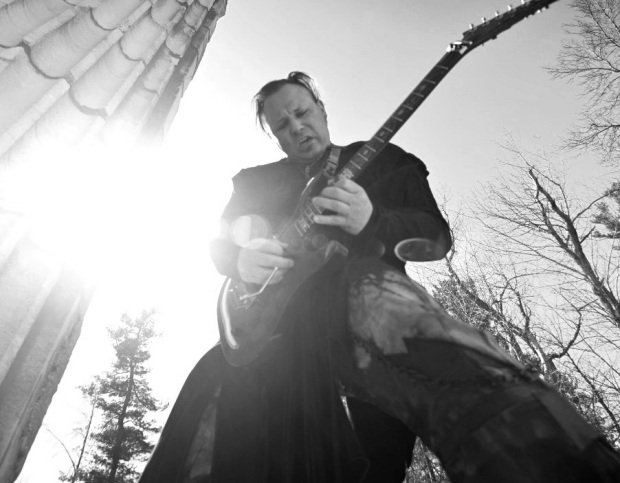 TONY MacALPINE – Edge of Insanity (1985 Shrapel)
TONY MacALPINE – Edge of Insanity (1985 Shrapel)
Tony MacAlpine seemed to be in every guitar magazine when I was a kid, but I never got to hear his music. He looked cool, and he was highly praised as a shredder, but his music (on Shrapnel records) was impossible to find unless you ordered it from a specialty shop. Like most of Shrapnel’s output, it was produced by Mike Varney.
His 1985 solo album Edge of Insanity features an impressive band: Journey’s Steve Smith on drums, and of course it’s common knowledge that Billy Sheehan played bass. The album is instrumental.
Opener “Wheel of Fortune” has a neoclassical vibe, with the rapid fire bassline enabling MacAlpine to focus on the melody rather than shred his way throughout. There is certainly a commonality in terms of musical direction with Yngwie, but Tony’s approach is more easily digested. Tony’s music has an actual bottom end thanks to Billy, and of course Steve Smith’s technique speaks for itself. He’s more than capable of heavy metal hammering as he does on “Wheel”, but listen carefully and you will hear his signature cymbal work, so unique to me.
“The Stranger” discards some of the neoclassical robes, and rocks a more straight-ahead blitz. Tony has a wicked keyboard solo mid-song, showing the breadth of his abilities. The pulse of the song is all Sheehan, and Smith’s fills sound a lot like a certain band that started with a “J”.
A live solo called “Quarter to Midnight” is unaccompanied. It reminds me of a Randy Rhoads solo. There’s some nice whammy work near the end, which was so popular in the era.
A ballady song called “Angrionia” (mis-printed on the back cover, but correctly in the booklet) follows; quite a nice little tune with the occasional bursts of neoclassical guitar speed. Billy has a couple nice rips as well. MacAlpine multitracks his guitars for effect.
“Empire in the Sky” has a very cool keyboard intro, that leads into a gallopy metal number. This has a mid-tempo vibe like Maiden circa Seventh Son when keyboards were happening. You could imagine this coming from that era, though of course Tony was three years ahead. His doubletracked leads set it apart from that, and there are some chunky riff chords happening beneath, though this is not a riff album. There’s also some outro guitar twangin’ that is absolutely freakin’ rib-shattering.
An Yngwie vibe pervades “The Witch and the Priest”. You hate to make comparisons, and it seems lazy, but when you hear a vibe there might be something to it. Of course, Billy Sheehan and Steve Smith help make it sound less Yngwie. Tony’s tone is warmer than the Swedish shredder’s as well.
“The Taker” is the only song with Tony playing bass and it’s less prominent for that reason. This tune is a full-speed blaze, with Tony deftly weaving melody through all his playing, and then suddenly taking a left turn with harpsichord-like keys and then some organ for good measure! “The Taker” keeps you on your toes.
Tony treats us to actual classical music next: his spin on Chopin. “Prelude 16, Opus 28” is performed on piano, and you’d never guess it wasn’t from a professional classical pianist. This prelude leads into Tony’s “Edge of Insanity”, a deep cut title track and one that allows the chug-chug-chug of the metal to come through. There’s still a soaring melody and flying bassline to absorb. Smith’s drum parts are smashing – literally. A great tune and a little easier to digest than the speedier stuff.
“The Raven” has classical keys opening a speedy metal rollercoaster ride. Once again, Smith is classing up the place several notches with his signature fills. Tony rarely lets up, constantly treating the listener to impressive shred. He switches tones (and probably guitars) at some points, giving the lead work different voices.
The closing track, “No Place in Time” has some slinky Billy bass, and really allows him to have some of the spotlight. His playing here is all about the groove he’s laying down, and how he complements Tony’s lead. MacAlpine uses doubletracked guitars and plays a slow melody. It’s not the most memorable track, and not the most effective closer.
Edge of Insanity is more accessible than a lot of instrumental guitar albums of the era. If some of those other artists seem daunting but you’d still like a taste of neoclassic rock, then go for some Tony MacAlpine.
3.5/5 stars






